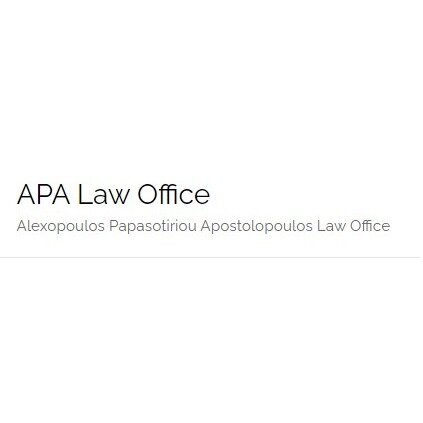Best Renewable & Alternative Energy Lawyers in Greece
Share your needs with us, get contacted by law firms.
Free. Takes 2 min.
Or refine your search by selecting a city:
List of the best lawyers in Greece
About Renewable & Alternative Energy Law in Greece
Renewable and alternative energy has emerged as a pivotal sector in Greece's economy and energy transition strategy. The country boasts significant natural resources, particularly solar and wind, making it well-positioned to generate and export green energy. In recent years, Greece has made robust legislative and regulatory efforts to foster the development, investment, and integration of renewables into its energy system. The legal framework is designed to not only achieve ambitious climate targets but also encourage innovation and private participation while balancing environmental protection and public interests.
Why You May Need a Lawyer
Lawyers specializing in renewable and alternative energy law in Greece provide critical assistance in a variety of circumstances. Common situations include:
- Navigating complex licensing and permitting processes for renewable energy projects.
- Drafting and negotiating contracts, such as Power Purchase Agreements or joint venture arrangements.
- Understanding land-use and property rights issues related to project development.
- Ensuring compliance with local, national, and EU regulations and incentive schemes.
- Representing clients in disputes related to project construction, operation, or decommissioning.
- Guiding mergers, acquisitions, and sales of renewable energy assets or companies.
- Providing advice on environmental impact assessments and regulatory approvals.
Given the technical and regulatory complexity of the industry, professional legal advice is often essential for both businesses and individuals involved in the sector.
Local Laws Overview
Greek legislation on renewable and alternative energy is extensive and closely harmonized with European Union directives and climate policies. Key aspects include:
- Law 3468/2006 - The primary statute on the generation of electricity from renewable energy sources and co-generation of heat and power. It has been amended several times to incorporate evolving EU requirements and national priorities.
- Licensing and Permitting - Developers must secure a range of permits, including environmental approvals and grid connection offers, before construction starts. A one-stop digital platform aims to streamline these processes.
- Feed-in Tariffs and Auctions - Greece employs competitive tenders and guaranteed tariffs to support renewables. Legal rules determine eligibility and project participation in these support schemes.
- Land Use - Clear provisions govern the use of land for solar, wind, biomass, and hydro projects, including zoning, expropriation, and lease of state land.
- Grid Integration - The operator of the Hellenic Electricity Transmission System (ADMIE) manages grid access and connection, following a regulated process to ensure system reliability and non-discrimination.
- Environmental Protection - Environmental impact assessment requirements are strictly enforced, with detailed procedures for both large projects and smaller installations.
- Corporate and Investment Laws - Foreign and domestic investors benefit from dedicated investment incentives tailored for renewable energy projects.
Regulations are subject to frequent updates to reflect Greece's dynamic energy policy landscape and commitments under the EU Green Deal.
Frequently Asked Questions
What types of renewable energy are most common in Greece?
Solar and wind energy are the leading sectors in Greece due to abundant sunlight and strong wind conditions, particularly on islands and coastal areas. Hydropower and biomass are also used, albeit at a smaller scale compared to solar and wind.
Do I need a permit to build a solar or wind energy project in Greece?
Yes, most renewable energy projects require various permits, including installation and operating licenses, environmental approvals, and grid connection agreements. The type and level of permits can depend on the capacity and location of the project.
Are there government incentives for investing in renewables in Greece?
Greece offers several incentives, such as feed-in tariffs, participation in energy auctions, investment grants, and tax advantages. Incentive schemes are periodically updated to comply with EU policies and national objectives.
Can foreign investors own renewable energy assets in Greece?
Yes, there are very few restrictions on foreign ownership in the sector. Both individuals and companies from abroad can invest in or fully own renewable energy assets in Greece, subject to the same regulations as domestic entities.
How long does the permitting process usually take?
The timeline varies depending on the project's complexity, size, and location, as well as local government workloads. Some permits can be obtained within a few months, while more complex projects may require over a year. Recent reforms aim to speed up processing times.
What are the main challenges in project development?
Common challenges include navigating the multi-stage permitting process, securing suitable land or sea area, ensuring grid availability and connection, dealing with environmental concerns, and managing local community relations.
What role does the EU play in shaping Greek renewable energy law?
EU directives and regulations set binding objectives for Greece, including targets for renewable energy production and emission reductions. Greek law is consequently aligned with EU standards, and compliance is essential for project developers.
How are disputes in renewable energy projects resolved?
Disputes may be resolved through negotiation, mediation, arbitration, or court proceedings, depending on contracts and the nature of the conflict. Legal representation is strongly advised in any dispute.
Are environmental impact assessments always required?
Most large-scale projects must undergo an environmental impact assessment before receiving permits. Smaller or low-impact projects may qualify for simplified procedures, but some form of environmental vetting is nearly always required.
Can I install small-scale renewable energy systems at my home or business?
Yes, small-scale systems for self-generation, such as rooftop solar panels, are allowed and encouraged. There are specific rules and sometimes incentives for such installations, with a simplified permitting process for small systems.
Additional Resources
If you are seeking further information, consider consulting the following sources:
- Ministry of Environment and Energy of Greece - The main authority responsible for energy policy and regulation.
- Regulatory Authority for Energy (RAE) - Supervises and regulates the energy market, including renewables.
- Independent Power Transmission Operator (ADMIE) - Handles grid operations and connections for renewable projects.
- Hellenic Association of Photovoltaic Companies (HELAPCO) - Industry association for solar energy stakeholders.
- Hellenic Wind Energy Association (HWEA) - Industry association for wind energy investors and developers.
- Enterprise Greece - Provides information on investment opportunities and incentives for foreign and domestic investors.
- Local law firms and renewable energy consultants specializing in Greek energy law.
Next Steps
If you need legal advice or representation related to renewable and alternative energy in Greece, the following steps can help you proceed efficiently:
- Clearly identify your needs, such as project development, permitting, investment, or dispute resolution.
- Gather all relevant documents and information regarding your project or issue.
- Research lawyers or firms with proven expertise in Greek energy law and renewable energy projects.
- Arrange initial consultations to discuss your case, ask about their experience, and clarify fee structures.
- Check whether you qualify for government incentives or special fast-track investment procedures.
- Stay informed about the latest changes in Greek and EU renewable energy policies to ensure compliance.
Taking these actions will position you to navigate the legal and regulatory landscape more confidently and maximize the success of your renewable or alternative energy endeavors in Greece.
Lawzana helps you find the best lawyers and law firms in Greece through a curated and pre-screened list of qualified legal professionals. Our platform offers rankings and detailed profiles of attorneys and law firms, allowing you to compare based on practice areas, including Renewable & Alternative Energy, experience, and client feedback.
Each profile includes a description of the firm's areas of practice, client reviews, team members and partners, year of establishment, spoken languages, office locations, contact information, social media presence, and any published articles or resources. Most firms on our platform speak English and are experienced in both local and international legal matters.
Get a quote from top-rated law firms in Greece — quickly, securely, and without unnecessary hassle.
Disclaimer:
The information provided on this page is for general informational purposes only and does not constitute legal advice. While we strive to ensure the accuracy and relevance of the content, legal information may change over time, and interpretations of the law can vary. You should always consult with a qualified legal professional for advice specific to your situation.
We disclaim all liability for actions taken or not taken based on the content of this page. If you believe any information is incorrect or outdated, please contact us, and we will review and update it where appropriate.
Browse renewable & alternative energy law firms by city in Greece
Refine your search by selecting a city.

















